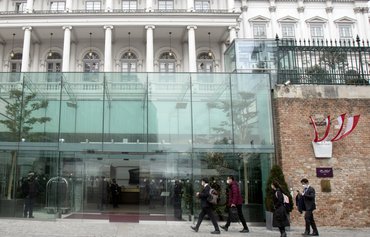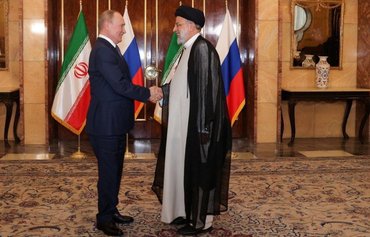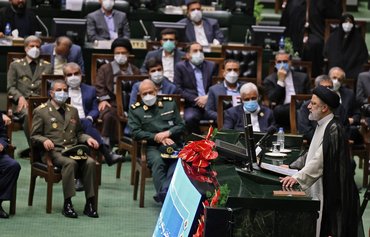Iranian president Ebrahim Raisi's official visit to Moscow on Thursday (January 20) has angered many in Iran who say the Islamic Republic is handing off what is left of the country to Russia after selling off the rest through previous deals with China.
Iranian media have been filing incessant reports on Raisi's trip to Moscow, interviewing experts about it and describing it as "a positive development in Iran's foreign policy" and "a step forward in Iranian diplomacy".
Raisi himself said Iran has "no limits for expanding ties with Russia", AFP reported.
The Iranian and Russian presidents reportedly discussed "long-term co-operation within a 20-year framework" during their meeting.
![Iranian president Ebrahim Raisi speaks at the Duma on January 20. [president.ir]](/cnmi_di/images/2022/01/20/33661-Duma-Raisi-Russia-600_384.jpg)
Iranian president Ebrahim Raisi speaks at the Duma on January 20. [president.ir]
![Iranian president Ebrahim Raisi arrives in Moscow on January 19. His Russian counterpart did not greet him at the airport. [president.ir]](/cnmi_di/images/2022/01/20/33662-Iran-Russia-Raisi-600_384.jpg)
Iranian president Ebrahim Raisi arrives in Moscow on January 19. His Russian counterpart did not greet him at the airport. [president.ir]
The two leaders have directed their foreign ministers to prepare a roadmap for the 20-year agreement, said Foreign Minister Hossein Amir-Abdollahian, noting that a number of topics "must be urgently discussed between the two parties to define a framework".
Pivoting to the East
Iran's foreign minister, who accompanied Raisi on the trip, did not elaborate on the "roadmap", but described the meeting between the two presidents as "warm and sincere", detailing how they met in the Kremlin for three hours despite "COVID-19 restrictions".
However many social media observers noted the long distance between the two ends of the table where the two presidents were seated.
The details of the 20-year deal have yet to be officially announced, much in the same opaque manner as Iran's 25-year agreement with China.
After the March 2021 signing of the Iran-China "strategic co-operation pact" in Tehran, many Iranians accused the regime of "selling Iran".
Many now accuse the regime of selling the rest of it -- this time, to Russia.
According to various media reports, Iran plans to buy 200 train locomotives from Russia -- a move some in Iran regard with deep skepticism, despite the country's desperate need for new transportation infrastructure.
This suspicion is rooted in prior experience: Moscow previously sold one of the world's oldest atomic reactors to Tehran, at an extremely high price, and many suspect the same will happen with the locomotives.
At the Kremlin on Thursday, Putin said the volume of commercial transactions between Iran and Russia had increased by 38% in 2020, compared to 2019.
In September, Tehran joined the Shanghai Co-operation Organisation, a central Asian security body led by Beijing and Moscow.
The reality that Iran is becoming less independent, more distanced from the West, amid nuclear negotiations, and is increasingly cozying up to China and Russia, was reflected in the Iranian markets on Thursday.
The national currency dropped some 8%, and the stock market index plummeted.
Critics say longterm, all-encompassing deals with China and Russia violate the policy upon which Iran's official slogan -- "Neither East, nor West, only the Islamic Republic" -- is based.
Many political and economic experts have described Iran's murky new agreement with Russia as another sign that it is pivoting to the East.
But the Iranian regime continues to assert that these deals are in the country's "political and economic interests".
Frosty welcome
Despite Iran's efforts to present the visit differently, diplomatic protocol was seemingly set aside upon Raisi's arrival in Moscow.
Russian president Vladimir Putin failed to greet the Iranian president at the airport, and Russia's foreign minister Sergei Lavrov likewise did not show up to the airport to greet his Iranian counterpart.
Instead, the Russian energy minister and deputy foreign minister came to greet Raisi and the Iranian delegates at the airport.
There was no official welcome ceremony, per diplomatic protocol, at the Kremlin, underscoring Tehran's weakened status and Moscow's show of power.
This disparity was further highlighted in a video clip published by IRNA, in which Putin asks Raisi to "say hello to Iranian leader Ali Khamenei for him".
Raisi and his foreign minister's visit to Moscow came amid increasing concerns about the possibility of a Russian attack on Ukraine, which observers have described as "extremely dangerous".
It also came as the Iranian ISNA news agency reported that China, Russia and Iran will hold joint naval drills on Friday (January 21).
The "2022 Marine Security Belt" exercise will take place in the north of the Indian Ocean, and is the third joint naval drill between the three countries, with a late 2019 drill staged in the Indian Ocean amid tensions with the Gulf states.
The spokesman for the exercises, Admiral Mustafa Tajeddini, told state television they would include the participation of 11 naval units from the armed forces of Iran and three units from the Islamic Revolutionary Guard Corps (IRGC) navy.
Three units from Russia and two units from China also will take part, he said.

![Iranian president Ebrahim Raisi speaks with his Russian counterpart in Moscow on January 20. [president.ir]](/cnmi_di/images/2022/01/20/33660-Putin-Raisi-Moscow-600_384.jpg)






